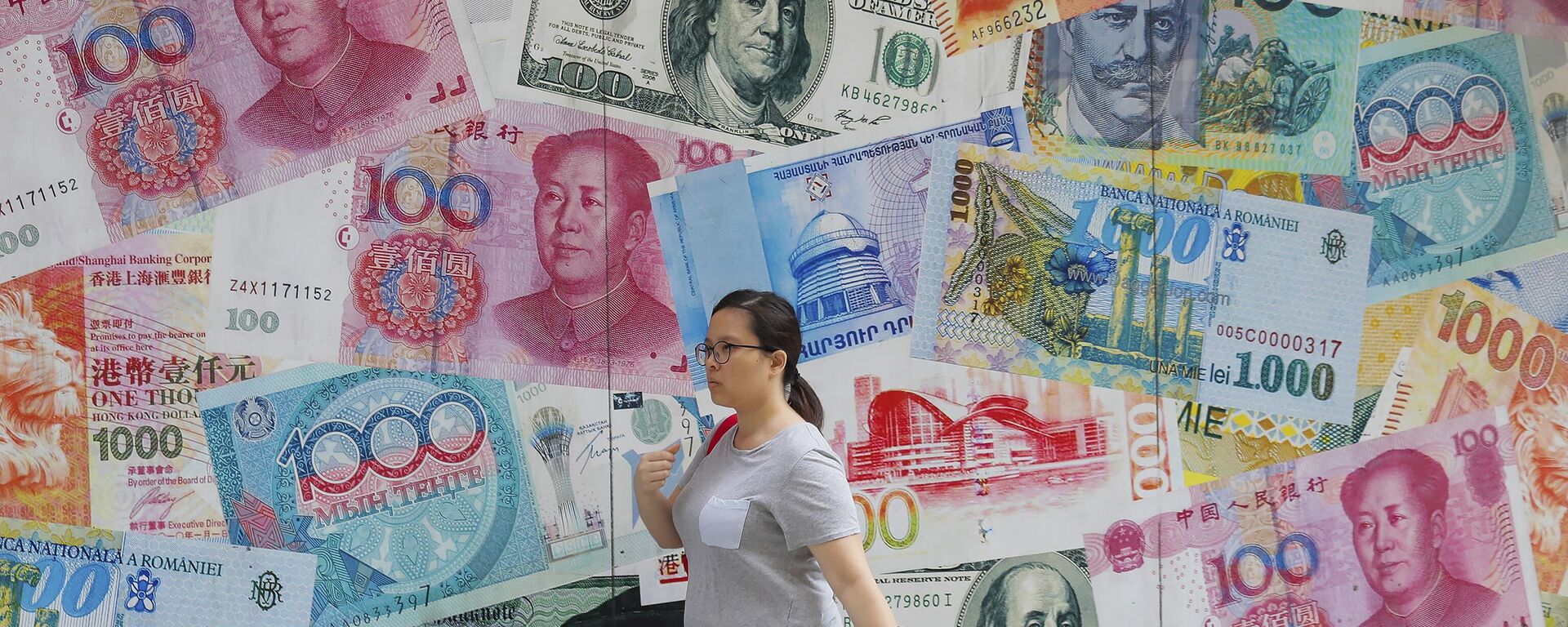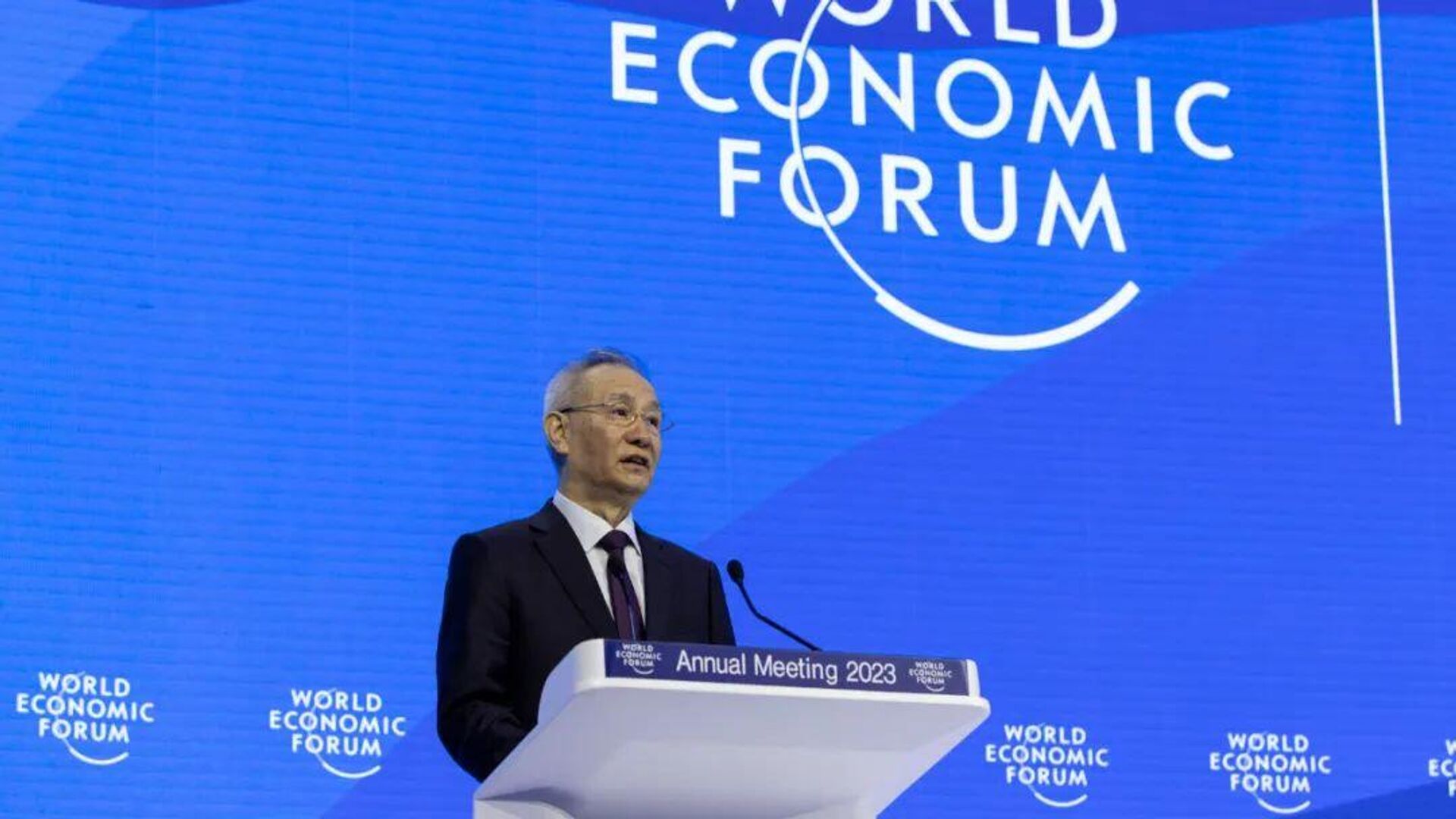https://sputnikglobe.com/20230117/chinese-vice-premier-liu-he-urges-world-to-abandon-cold-war-mentality-at-davos-forum-1106434558.html
China Urges World to ‘Abandon Cold War Mentality’ at Davos Forum
China Urges World to ‘Abandon Cold War Mentality’ at Davos Forum
Sputnik International
In 2018, the US committed itself to a strategy of “great power competition” with Russia and China, who it claimed were aiming to upend the “rules-based international order” by trying to become Washington’s equals. However, both nations have disavowed such goals, as well as the formation of regional power blocs.
2023-01-17T16:58+0000
2023-01-17T16:58+0000
2024-01-14T17:40+0000
liu he
china
cold war
2023 world economic forum in davos
asia
world economic forum in davos
https://cdn1.img.sputnikglobe.com/img/07e7/01/11/1106434736_0:112:1080:720_1920x0_80_0_0_91be8694b34ba756d596d530fc7d447c.jpg
Chinese Vice Premier Liu He said the country’s market socialist economy was open for business and would soon bounce back from a troubled previous year during his speech at the World Economic Forum in Davos, Switzerland, on Tuesday. However, he also warned of the dangers of the planet breaking into competing political and strategic blocs as per the twentieth century.“We believe that an equitable international economic order must be preserved by all of us,” he added.Liu’s comments evoked the annual forum’s theme for 2023: “Cooperation in a Fragmented World." He likewise made clear the People’s Republic of China opposes unilateralism as well as economic protectionist policies, which has been interpreted as a swipe at the United States’ moves in recent months to separate its own microchip suppliers in East Asia from its Chinese competitor.The vice premier, who is also a prominent economist and director of the Communist Party of China’s Central Financial and Economic Affairs Commission, predicted that China’s hybrid economy, which combines socialist economic planning of core industries with a large capitalist market sector, would rebound in the coming year.“Life has been restored to normal in China,” he said. “Our focus [on Covid] is now on treating the elderly and we have sufficient supplies.”Until December, China had spent nearly three years under a strict program of controlling COVID-19 outbreaks with lockdowns, support networks for quarantined populations, and testing on a massive scale to identify all potential cases.The lockdowns forced economic planners to repeatedly revise their growth expectations. Economic data released on Tuesday showed China’s gross domestic product (GDP) grew at just 2.9% last year - far below the 5.5% expected in Beijing.
https://sputnikglobe.com/20230109/penny-wise-pound-foolish-us-embargo-driving-china-to-pioneer-own-semiconductor-industry-1106173244.html
https://sputnikglobe.com/20230109/chinas-yuan-hits-highest-level-since-august-2022-amid-covid-19-restrictions-lifting-1106155549.html
china
Sputnik International
feedback@sputniknews.com
+74956456601
MIA „Rossiya Segodnya“
2023
News
en_EN
Sputnik International
feedback@sputniknews.com
+74956456601
MIA „Rossiya Segodnya“
Sputnik International
feedback@sputniknews.com
+74956456601
MIA „Rossiya Segodnya“
2023 wef in davos, cold war mentality, chinese vice-premier liu he
2023 wef in davos, cold war mentality, chinese vice-premier liu he
China Urges World to ‘Abandon Cold War Mentality’ at Davos Forum
16:58 GMT 17.01.2023 (Updated: 17:40 GMT 14.01.2024) The US committed itself to a strategy of “great power competition” with Russia and China in 2018, claiming that they looked to upend the “rules-based international order” by trying to become Washington’s equals. However, both nations have disavowed such goals, as well as the formation of regional power blocs.
Chinese Vice Premier Liu He said the country’s market socialist economy was open for business and would soon bounce back from a troubled previous year during his speech at the World Economic Forum in Davos, Switzerland, on Tuesday.
However, he also warned of the dangers of the planet breaking into competing political and strategic blocs as per the twentieth century.
“We have to abandon the Cold War mentality, try to understand the essence of things from the perspective of material duality, endeavor to build a community with a shared future for mankind, and join hands to respond to global challenges,” Liu told attendees at Davos.
“We believe that an equitable international economic order must be preserved by all of us,” he added.

9 January 2023, 17:27 GMT
Liu’s comments evoked
the annual forum’s theme for 2023: “Cooperation in a Fragmented World." He likewise made clear the People’s Republic of China opposes unilateralism as well as economic protectionist policies, which has been interpreted as a swipe at the United States’ moves in recent months to
separate its own microchip suppliers in East Asia from its Chinese competitor.
The vice premier, who is also a prominent economist and director of the Communist Party of China’s Central Financial and Economic Affairs Commission, predicted that China’s hybrid economy, which combines socialist economic planning of core industries with a large capitalist market sector, would
rebound in the coming year.
“We are confident that in 2023 China’s growth will most likely return to its normal trend. The Chinese economy will see a significant improvement,” he said, noting that the country’s economic performance since abruptly ending its Dynamic Zero Covid policy last month has been “beyond our expectations.”
“Life has been restored to normal in China,” he said. “Our focus [on Covid] is now on treating the elderly and we have sufficient supplies.”
Until December, China had spent nearly three years under a strict program of controlling COVID-19 outbreaks with lockdowns, support networks for quarantined populations, and testing on a massive scale to identify all potential cases.

9 January 2023, 09:28 GMT
While the policy helped protect China’s population and economy for several years from the ravages of the pandemic seen elsewhere in the world, the arrival in late 2021 of the ultra-infectious Omicron variant of the virus put Beijing on a path of rolling, seemingly nonstop lockdowns that tested both the government’s budget and the population’s patience, culminating in protests in December 2022.
The lockdowns forced economic planners to repeatedly revise their growth expectations.
Economic data released on Tuesday showed China’s gross domestic product (GDP) grew at just 2.9% last year - far below the 5.5% expected in Beijing.




